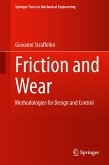Sliding friction is one of the oldest problems in physics and certainly one of the most important from a practical point of view. The ability to produce durable low-friction surfaces and lubricant fluids has become an important factor in the miniaturization of moving components in many technological devices, e.g. magnetic storage, recording systems, miniature motors and many aerospace components. This book will be useful to physicists, chemists, materials scientists, and engineers who want to understand sliding friction. The book (or parts of it) could also form the basis for a modern undergraduate or graduate course on tribology. This second edition covers several new topics including friction on superconductors, experimental studies and computer simulations of the layering transition, nanoindentation, wear in combustion engines, rubber wear, effects due to humidity, rolling and sliding of carbon nanotubes and the friction dynamics of granular materials.
"This comprehensive and well-written book is entirely devoted to fundamental aspects of friction, and especially to new theoretical and technological problems of sliding friction. The book can be very useful to physicists, chemists, materials scientists and engineer who want to understand the basic aspects of sliding friction."
-- Zentralblatt Math
-- Zentralblatt Math








